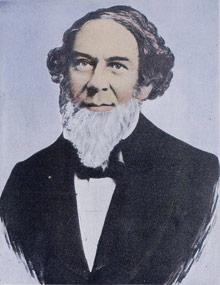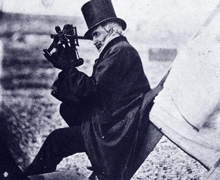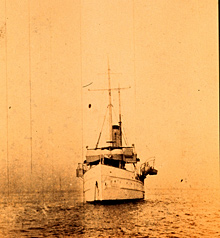Alexander Dallas Bache: Leader of American Science and Second Superintendent of the United States Coast Survey
- Introduction
- Military Beginnings
- Leading the Community
- Second Superintendent Coast Survey
- Expanding American Science
- War Time Patriot and Leader

Alexander Dallas Bache, second superintendent of the U.S. Coast Survey. Click image for larger view.
The most dominant figure in American science prior to and during the Civil War was Alexander Dallas Bache (1806-1867), second superintendent of the United States Coast Survey. He was a great-grandson of Benjamin Franklin; either related to or friends with many high government officials and military and naval officers; and friend, ally, and colleague of many of the scientific luminaries of the age.
Military Beginnings to a Distinguished Career
Bache entered the U.S. Military Academy at West Point at 15 and graduated first in the class of 1825 without receiving a single demerit. He taught mechanical engineering at West Point following graduation and then served as an engineer during construction on Fort Adams at Newport, Rhode Island. During his Army years, Bache made many lifelong friends including Colonel Joseph Totten, who later became head of the Corps of Engineers, and Jefferson Davis, who served in many high political offices prior to becoming President of the Confederacy.
Leading the American Science Community as an Educator
He resigned his military commission when he was appointed professor of natural philosophy at the University of Pennsylvania in 1828, and began a successful career as scientist, educator, and leader of the American science community. Bache became editor of the Journal of the Franklin Institute in 1829, using this position to raise the standards of American science and establish a professional science community. He also established himself as a progressive educator during this period by founding the Girard College for Orphans and by serving as first principal of the Philadelphia Central High School. This school, with its emphasis on science and the arts, served as the model for hundreds, if not thousands, of public schools. He wrote scientific papers during this period on meteorology; he established the first magnetic observatory in the Western Hemisphere; and he wrote papers on such eminently practical matters as the cause of steam boiler explosions.
Second Superintendent of the Coast Survey

Alexander Dallas Bache peering through a sextant. Click image for larger view.
When Ferdinand Hassler, the first superintendent of the Coast Survey, died in 1843, Joseph Henry, then at Princeton University, led the movement to select Bache as the next superintendent. Bache began his tenure with a remarkable vision—science in the service of the nation; science as the handmaiden of commerce and defense; scientific standards enforced by peer review; government patronage of university research; ferreting out scientific charlatans; and a mission for the Coast Survey that encompassed virtually all aspects of the physical sciences. Hassler laid the foundation, but Bache “built the house” not only of the Coast Survey but for much of American physical science.
The Coast Survey under Bache expanded its core missions of hydrography, geodesy, topography, and the printing arts. Bache began studying the Gulf Stream Current in 1845, directed tide observers to make meteorological observations, began geomagnetic studies, and guided the development of mathematical techniques not only for phenomena such as tide predictions and geomagnetism, but also for adjusting triangulation networks and computing most probable mathematical values of angles and distances.
During Bache’s tenure from 1843 to 1867, the geographic realm of the Coast Survey continually expanded, touching every maritime state and territory. With a larger scope came larger budgets and, within a few years, the budget had increased five-fold. Under his leadership, the Coast Survey was not only a chartmaker, but also one of the great science organizations of the world.
Expanding American Science Beyond the Coast Survey

Named in honor of the second Superintendent, the Coast and Geodetic Survey ship Bache sailed from 1901 to 1927. Click image for larger view.
Bache’s hopes for American science did not stop with the Coast Survey. He was instrumental in the selection of Joseph Henry as the first Secretary of the Smithsonian Institution and for many years was its most influential regent. As one of the first presidents of the American Association for the Advancement of Science, he called for establishing a national organization to oversee the direction of science in the United States. This organization became the National Academy of Sciences during the Civil War, and Bache was elected its first president.
War Time Patriot and Leader
Leading the Coast Survey during the Civil War stands out as Bache’s crowning achievement. He immediately directed the Coast Survey to defend the Union at the outset of the armed conflict. During the War, he served as one of three members of the Blockade Strategy Board, one of three members of the Navy Permanent Commission for scientific matters, and vice president of the U.S. Sanitary Commission, the forerunner of the American Red Cross. Within weeks of the Civil War erupting at Fort Sumter, South Carolina, the Coast Survey compiled Notes on the Coast of the United States for the blockading Union squadrons and assigned its topographers and hydrographers to Union Army and Navy commands. The output of Coast Survey map and chart production increased four-fold during the War.
In the days preceding the Battle of Gettysburg, Bache was assigned to direct the construction of the defenses of Philadelphia. Although these defenses were never needed, he suffered a form of stroke or neurological disorder during these exertions. He never recovered and died three years later on February 17, 1867. He endowed the National Academy of Sciences with $40,000, a donation that is commemorated today by the Bache Fund, which supports studies on topics ranging from geomagnetism to coral reefs. Many would agree that Bache died in service to the nation.









